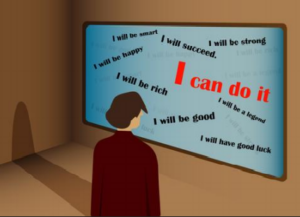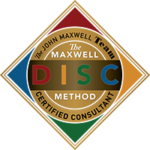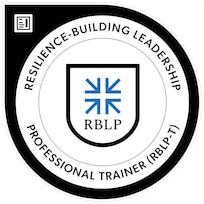Henry Ford famously said, “Whether you think you can or think you can’t, you’re right.” It turns out this quote is not only inspiring, it’s also true according to decades of empirical research. Constructive thought pattern strategies, including self-talk and mental imagery, are one of the three primary groups of research-based self-leadership strategies. Self-leadership describes one’s ability to motivate and influence themselves.
We all have loops that play over and over in our heads in the background. These loops are both negative and positive, and researchers refer to them as habitual ways of thinking. Specific circumstances trigger these loops, which involve our beliefs, self-talk, and imagined experiences. Self-talk and mental imagery influence one another, essentially creating our thought patterns. By becoming aware of habitual thought patterns that no longer serve us, we can consciously remove them and replace them with constructive thought patterns that lead to better outcomes.
Self-Talk
 Self-talk is what we tell ourselves, whether we’re conscious of our thoughts or not. If you don’t think that you talk to yourself, you are not yet conscious of your self-talk. If you know that you talk to yourself and haven’t done anything to influence the content, you may have noticed how critical and cruel that little voice inside can be.
Self-talk is what we tell ourselves, whether we’re conscious of our thoughts or not. If you don’t think that you talk to yourself, you are not yet conscious of your self-talk. If you know that you talk to yourself and haven’t done anything to influence the content, you may have noticed how critical and cruel that little voice inside can be.
Your self-talk impacts your performance—a 1977 study of 12 gymnasts who were competing for a spot on the men’s U.S.A. Olympic team found that those who made the team practiced intentional self-talk, while those who did not make the team didn’t. Numerous other studies have shown similar outcomes.
The first step in changing your self-talk is becoming aware of current ways of thinking. Try to catch yourself thinking negatively. Perhaps you’ve just finished up a meeting that went poorly, and you find yourself ridiculing your performance (e.g., I should have been more prepared). Then, you can think of a better thought to replace it with (e.g., I learned from this meeting, and I’ll prepare better next time). Once you start regularly noticing your thoughts, it will get easier, and replacing negative thoughts will naturally happen.
Mental Imagery
 Mental imagery is the process of imagining the successful completion of something that hasn’t happened yet. Research indicates that positive mental imagery effectively enhances performance across many arenas and works for people of all types of personalities. When mental imagery is used in sports psychology, a basketball player might visualize themselves sinking shots during the upcoming game in preparation for the actual game.
Mental imagery is the process of imagining the successful completion of something that hasn’t happened yet. Research indicates that positive mental imagery effectively enhances performance across many arenas and works for people of all types of personalities. When mental imagery is used in sports psychology, a basketball player might visualize themselves sinking shots during the upcoming game in preparation for the actual game.
In the professional realm, an organizational leader who has to make a speech at an important event could imagine themselves on stage, giving their speech precisely as they intend to at the actual event.
To practice mental imagery:
- Choose an event, small or large, that you have coming up and are feeling a little nervous about.
- Take some time before the event in a quiet space where you won’t be interrupted and close your eyes and take some deep breaths.
- Imagine yourself participating in the event as the best version of yourself.
- Imagine the feeling of accomplishment that you’ll have when the event is over.
- Repeat this exercise as many times as possible, and, eventually, you can create thought patterns that will support the outcomes you imagined.
Self-talk and positive mental imagery can boost performance for all types of tasks under many different conditions. As a self-leader, by choosing to practice positive self-talk and mental imagery intentionally, you can greatly enhance your performance on various tasks and ultimately achieve your larger goals.
Book a consultation with us now! Please do not hesitate to contact us with any questions. We would love to hear from you. Email at info@xcelmil.com.
Click here to learn more about our services.
Twitter: https://twitter.com/GraticMelody
LinkedIn: https://www.linkedin.com/in/melodygraticconsulting/
XcelMil, LLC is a certified Minority-Woman and Service-Disabled Veteran-Owned Small Business specializing in Executive Management Consulting and Leadership Development Training.































